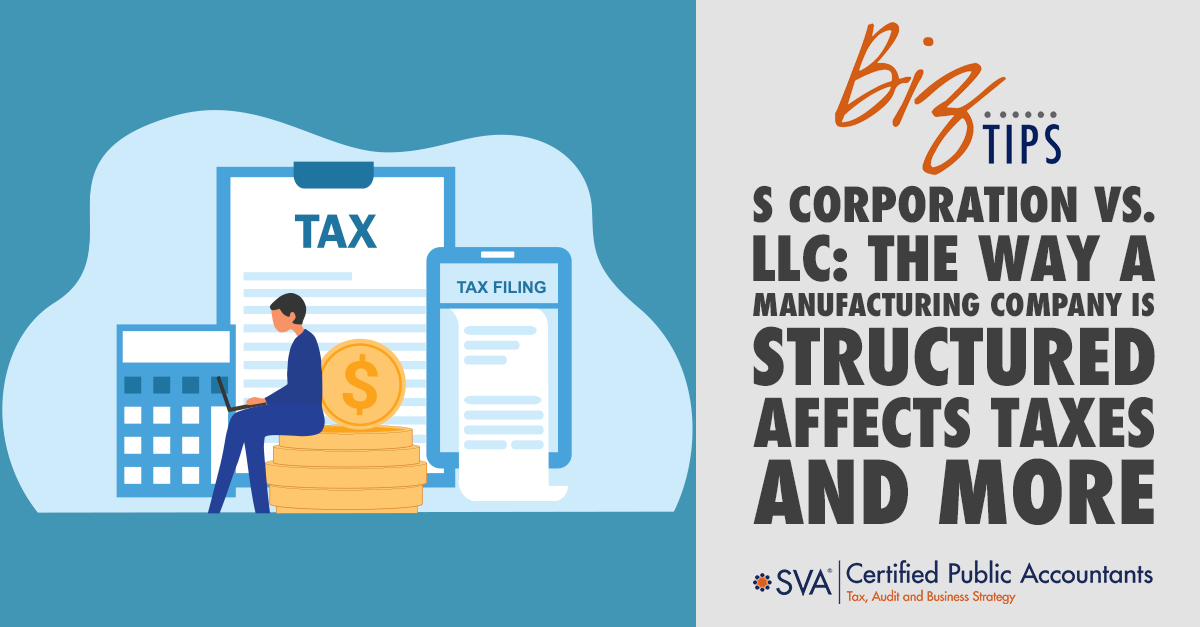| Highlights: |
- The article explains how choosing between an S corporation and an LLC significantly affects tax treatment, cash flow, and compliance for manufacturing businesses.
- It outlines key differences in income taxation, self-employment taxes, ownership flexibility, and administrative requirements for each entity structure.
- Guidance emphasizes evaluating growth plans, profitability, and long-term tax strategy with advisors to select the most advantageous structure.
|
For decades, owners of small to midsize manufacturing companies have opted for the S corporation form of ownership, rather than being subject to the double taxation of C corporations.
However, in recent years, the limited liability company (LLC) has become another popular alternative.
Let’s compare these two business structures.
S Corporations
Unlike a C corporation, items of income and expenses are passed through to S corporation owners and reported on their individual income tax returns, similar to partners in a partnership. To qualify for S corporation status, the corporation must meet these requirements:
- Be a U.S. corporation
- Have only eligible shareholders (including individuals and certain trusts and estates)
- Have no more than 100 shareholders
- Have only one class of stock
An existing manufacturing company can switch to S corporation status by making an election by the 15th day of the third month of the tax year.
The Pros of an S Corporation Include:
Limited Liability
This is critical to owners of manufacturing companies. Usually, S corporation shareholders can’t be held personally liable for debts of the company. Thus, creditors can’t come after your personal assets (except in limited instances).
No Double Taxation
A C corporation is subject to tax twice — once on business income at the corporate level and again on the personal level when shareholders receive dividends. With an S corporation, income is taxable only at the personal level. In fact, an S corporation itself generally is exempt from tax.
Tax-Saving Opportunities for Owner-Employees
An S corporation owner-employee can opt how much to receive as salary vs. income distributions from the corporation. Finding the right mix can lower your overall tax bill. Unlike salary, income distributions aren’t subject to payroll taxes. But the owner must be paid a reasonable salary for services rendered. Otherwise, the IRS could reclassify distributions as salary, subject to payroll taxes, and also assess interest and penalties.
Ease of Ownership Transfer
It’s generally easier to transfer S corporation shares than ownership in other business entities. It’s possible to do so without dire tax consequences even if the business is terminated. An S corporation can survive the departure of its sole owner.
The Cons of an S Corporation Include:
Ownership Restrictions
As stated above, the requirements under federal law are rigid. For example, depending on the situation, the limit on the number of shareholders or restriction to one class of stock may hamper operations. However, certain family members can be counted as a single shareholder.
Profit and Loss Allocation
An S corporation is required to allocate profits and losses among the owners based on the percentage of ownership or number of shares owned.
Corporate Formalities
S corporations are bound by the strict laws affecting corporations imposed by the state. This means meeting certain registration and regulatory obligations. Be aware that an S corporation must register to do business in other states outside of its home jurisdiction.
LLCs
The popularity of LLCs has been growing dramatically. Briefly stated, an LLC combines the liability protection of C corporations with the tax benefits of S corporations and partnerships, but without some of the restrictions of S corporations. LLCs are authorized under state laws that vary around the country (many states don’t restrict ownership). LLC owners generally are referred to as “members.”
The Pros of an LLC Include:
Limited Liability
As the name implies, the limited liability protection afforded to LLCs is a significant attraction to LLC members. Creditors generally can’t touch their personal assets. This benefit can’t be overemphasized. In fact, protection may be even greater for LLCs than S corporations under prevailing state laws.
No Double Taxation
LLCs are generally taxed as partnerships (unless they elect otherwise), thereby avoiding double taxation. You may not even have to file a tax return for the LLC. However, a return is required if the LLC has more than one member.
Profit and Loss Allocation
An LLC member may be entitled to receive a disproportionate share of income and expenses. Unlike an S corporation, the allocation doesn’t have to be based strictly on ownership percentages.
Ownership Flexibility
There’s no limit on the number of members an LLC can have. Also, ownership is available to corporate and foreign entities.
(Download Video Transcript)
The Cons of an LLC Include:
Possible Tax Disadvantages for Owner-Employees
Generally, all business income that flows through to LLC owner-employees is subject to self-employment tax — even if it isn’t distributed to you. But such income may not be subject to self-employment tax if you’re the LLC member equivalent of a limited partner.
More Difficult Ownership Transfer
It’s often more difficult to transfer ownership of an LLC than it is to transfer S corporation ownership. Unlike corporations, there are no shares of stock. Typically, all members must approve new members or changes in the ownership percentages of existing members. Also, a single-member LLC will automatically be terminated if the member exits the organization.
Arriving at a Decision
While both forms of ownership have their pros and cons, LLCs are steadily on the rise. Nevertheless, you may find that an S corporation is preferable for your manufacturing company.
Conduct a thorough analysis with assistance from your tax advisor to determine which form of ownership is right for your business.
© 2022

